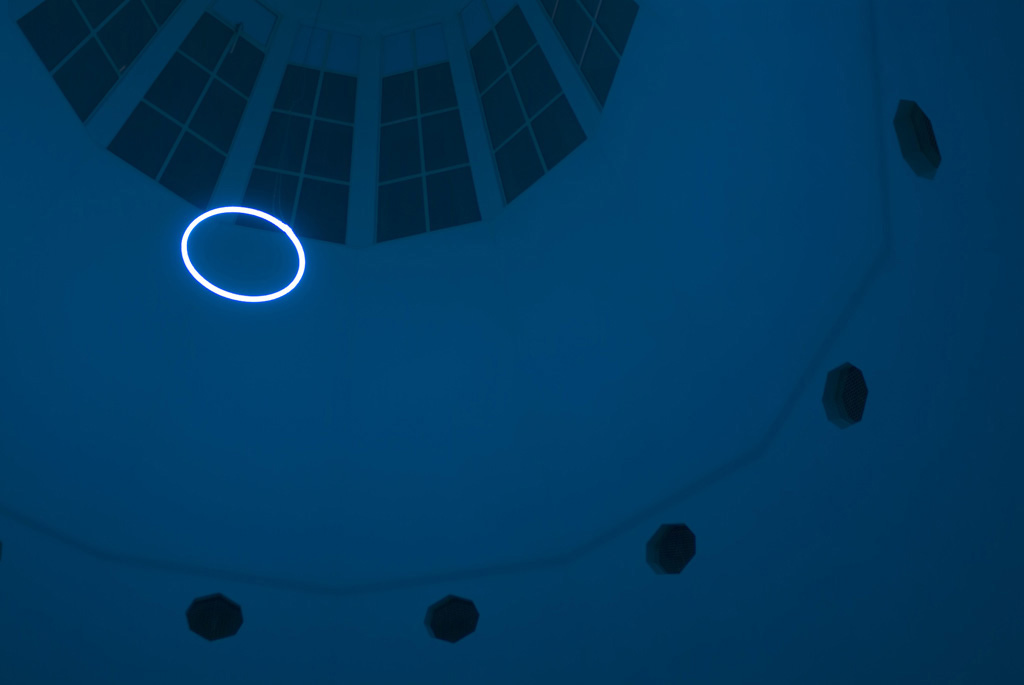sonArc::project
Jan-Peter E.R. Sonntag
24. February – 29. April 2007
Würtenbergischer Kunstverein Stuttgart
www.wkv-stuttgart.de
www.sonarc-ion.de
The Berlin artist and composer, Jan-Peter E.R. Sonntag , will be presenting his multidisciplinary project,
entitled sonArc::project , at the Württembergischen Kunstverein in Stuttgart from the 24. February
to
the 29. April , 2007. The work moves between the fields of electricity research, video, spatial
installation and performance.
Since the 1990s, Sonntag, whose artistic roots reach back to the minimal- and concept art as well as
to
the so-called new and experimental music, has repeatedly cooperated with scientific laboratories.
Alongside the examination of human perception, the question at the centre of his artistic work
concerns the visions of modernity – an unfinished project.
With sonArc::project, a project cycle in alternating aesthetic formats, the artist has been in search
of the essence of electricity as well as the possibility of domesticating lightening since 2003:
that is, in search of the electric/electronic sources and, at the same time, visions of our media age.




sonArc::ema – (Z) OZONE, 2007
In the cupola of the Kunstverein, Sonntag will attempt to domesticate lightening. Possible bolts of lightening
will be directed via the “golden dear“, situated on the top of the building, straight to the exhibition space
and controlled from there. Free, high-voltage plasmas and electromagnetic fields will then be sculpturally
formed and made experienceable to the senses. The visitor will be able to follow the weather conditions
on a computer which is logged into a meteorological early-warning network.

sonArc::ema – RADIAL, 2006
High-voltage installation
Sonntag’s most recent work forms the architectonic focus of the exhibition, the electronic high-voltage
installation “sonArc::ema–RADIAL:“ An installation – or rather an interactive “concert“ – comprising four
different electromagnetic fields, which can be performed by the audience. Thus, during the opening
weekend (23. – 25. Ferbuar 2007), the visitors can surf “wireless,“ through the signals and the noise
of the medium-wave “ether,“ and transform this into sound, light and ozon. With “sonArc::ema–RADIAL”
Sonntag has created the first and, until now, only electronic instrument that, by means of electricity
makes the air oscillate. He will perform the installation himself as a concert, together with his N-solab
at the museum night (17. March, 2007).





DYSTOPIA – radial, 2007
Resting on a water membrane with a 600 litre capacity and equipped with earphones, the visitor then submerges into
an apparently endlessly falling room. This effect is induced by the electromagnetic waves which directly surround him
and which are converted into acoustic and physical oscillations. Only by means of a field of black oil measuring
160 x 160 cm are the oscillations translated into visual wave patterns. Thus, under the copola there emerges
an amorphous wave reflection.


GAMMAvert #2, 1998 - 2006
A X-Seascape
“A museum setting: a White Cube, on the wall a timeless photograph: a seascape, taken from the shore
at Travemünder, the place in which I grew up. The chemistry of the film has captured the reflection
of light in a moment of calm sea on a grey day. For the enlargement, we worked with an historical tinting
procedure – a bronze-brown sea – with uranium nitrate (this makes the photograph extremely durable).
A highly sensitive radiological measuring system gauges the free isotopes in the space.
A field from the reflections of a deep frequency sine wave is in the architecture, its volume is full
of completely green light – the “green ray“ – oscillating at only one frequency/an optical sine wave
the sediments of the Baltic Sea have an activity of between 2 (Arkona) and 190 (Eckernförder Bucht)
becquerel per Kg.“ (Jan-Peter E.R. Sonntag)



sonArc::ion#1, 2005/06
1 channel HD-Video- and 5 channel Sound-Installation, 130 min., Loop
The video and sound installation is based on Sonntag’s opera “sonArc::ion-PROLOGUE“ by means
of thunderbolts, the ether and the over 100-year history of electrical/electronic music: from pure
RAW-data-extensions via data taken from “Studie2,“ by Karl Heinz Stockhausen (in digital image
and sound) to the freely swinging, “singing“ high voltage plasmas, which exchange their data
by “talking:” a first, purely electronically produced sound and emission, which the English engineer
and inventor, William Duddel already conceived in 1899.




















